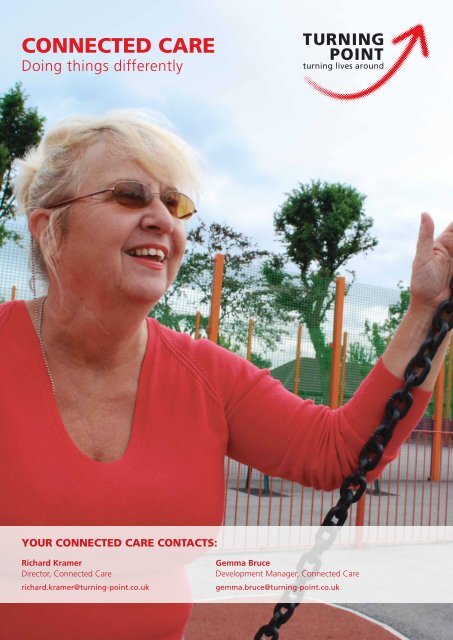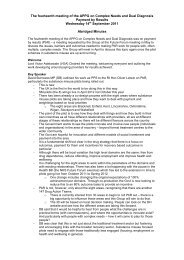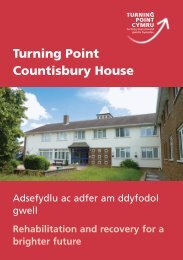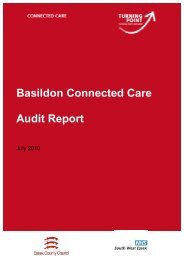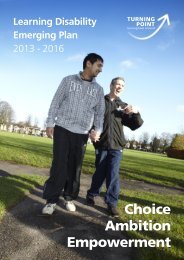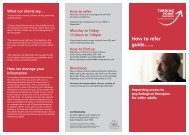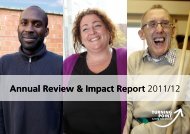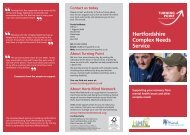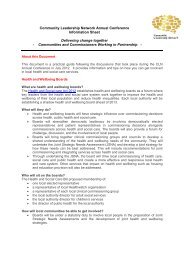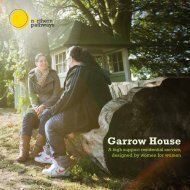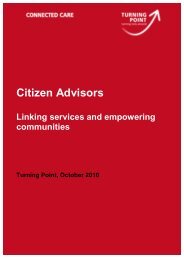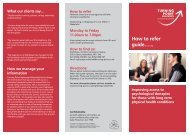ConneCted Care - Turning Point
ConneCted Care - Turning Point
ConneCted Care - Turning Point
You also want an ePaper? Increase the reach of your titles
YUMPU automatically turns print PDFs into web optimized ePapers that Google loves.
Connected <strong>Care</strong><br />
Doing things differently<br />
YOUR CONNECTED CARE CONTACTS:<br />
Richard Kramer<br />
Director, Connected <strong>Care</strong><br />
richard.kramer@turning-point.co.uk<br />
Gemma Bruce<br />
Development Manager, Connected <strong>Care</strong><br />
gemma.bruce@turning-point.co.uk
Co-production<br />
Blueprint<br />
<strong>Turning</strong> <strong>Point</strong> is one of the UK’s leading health<br />
and social care organisations. We’ve been<br />
running public services in communities across<br />
the country for almost 50 years. Our Connected<br />
<strong>Care</strong> model offers a way of working that<br />
enables commissioners to engage with their<br />
local communities, and use the insight gained to<br />
develop better services, jointly with them.<br />
What’s your challenge?<br />
• Understanding the needs of the community?<br />
• Integrating health and social care?<br />
• Supporting patients with a long term<br />
condition to better self manage?<br />
We think it is time for this kind of co-production<br />
to become the rule and not the exception.<br />
• Moving patients out of hospital into the<br />
community?<br />
Engaging successfully with local populations<br />
becomes more important every day. The changing<br />
public health landscape means new bodies with<br />
new responsibilities. The idea of “community<br />
engagement” matters in this new landscape even<br />
more than ever. For instance, the requirement<br />
placed upon Clinical Commissioning Groups<br />
(CCGs) is to put ideas of co-production of services<br />
and community engagement at the heart of<br />
their work. We all aspire to better public services.<br />
<strong>Turning</strong> <strong>Point</strong>’s Connected <strong>Care</strong> model is a proven<br />
and evidence-based method for improving service<br />
design. And that inevitably leads to better services<br />
too.<br />
Where in the changing landscape are<br />
you?<br />
Would some signposting from an<br />
established partner help you?<br />
“I want co-production between<br />
commissioners and communities in<br />
health and social care to become the<br />
rule and not the exception. If this is<br />
realised then it could have a profound<br />
impact on people’s lives by improving<br />
the way services are delivered. I believe<br />
our Connected <strong>Care</strong> model is the vehicle<br />
to enable sustainable co-production.”<br />
Lord Victor Adebowale<br />
Chief Executive <strong>Turning</strong> <strong>Point</strong><br />
Connected <strong>Care</strong> is <strong>Turning</strong> <strong>Point</strong>’s unique<br />
methodology for bringing about changes in the<br />
design and delivery of health, housing and social<br />
care services. This is about finding efficiencies in<br />
the system – crucial when budgets are so tight.<br />
We’ll help you rethink the way services work<br />
together to support a combination of needs, and<br />
look for ways to form an equal partnership with<br />
communities in the design and delivery of public<br />
services.<br />
Connected <strong>Care</strong> is a bespoke service. We’ll<br />
work with local commissioners to help define<br />
the problem, and provide tailor-made solutions.<br />
But there are four stages that are central to<br />
understanding the method:<br />
1. A community-led needs assessment<br />
is conducted by trained community<br />
representatives. These Community Researchers<br />
drive engagement in every section of the local<br />
community through rigorous research.<br />
When we describe our intervention as “bespoke”,<br />
what do we mean? Some examples might help<br />
you see how applicable the Connected <strong>Care</strong><br />
blueprint is to your local area. In Warrington we<br />
focused on neighbourhoods experiencing high<br />
levels of health inequalities, helping to inform the<br />
Council’s planning and improving engagement<br />
with the town’s most vulnerable residents. In<br />
the Gorleston area of Great Yarmouth we found<br />
solutions that helped to reduce emergency<br />
inpatient admissions. In Hammersmith and Fulham<br />
we launched a Community Champions scheme,<br />
providing community-based support across a<br />
wide range of services. The initiatives may be<br />
different but the method and outcome is the<br />
same: services produced in partnership are<br />
services that deliver.<br />
Let’s talk.<br />
2. This research leads to recommendations<br />
based on a strict cost benefit analysis. These<br />
are reviewed by a local steering group made<br />
up of local authority, NHS, third sector and<br />
community representatives.<br />
<strong>Turning</strong> <strong>Point</strong>’s Connected <strong>Care</strong> model works with commissioners and<br />
communities to co-design health and social care services. Since 2004, the<br />
Connected <strong>Care</strong> team have delivered community engagement and service<br />
design and set up new services - commissioned by local authorities, the NHS<br />
and most recently CCGs - across the country<br />
3. Service redesign or reconfiguration delivers<br />
new levels of efficiency – focusing on service<br />
integration and meeting the needs of service<br />
users and commissioners alike.<br />
4. Set-up of new services co-produced by the<br />
community.<br />
2 3
Voice of the community<br />
Meeting your agenda<br />
Connected <strong>Care</strong> offers a flexible yet robust<br />
model for service development and delivery.<br />
Connected <strong>Care</strong> does things differently: it<br />
accepts that a “top down” model of service<br />
development doesn’t meet individual needs,<br />
and that some existing care provision is in fact<br />
very “disconnected” with individuals that need<br />
our support falling down between the gaps of<br />
disjointed systems and services.<br />
Connected <strong>Care</strong> isn’t the solution to every commissioning problem. But it does<br />
solve many of the common headaches that commissioners face. Here are a few<br />
of them.<br />
Changing landscape<br />
biggest concerns right from the start.<br />
Instead, the Connected <strong>Care</strong> methodology<br />
fundamentally shifts the balance of power<br />
towards local people, allowing communities a key<br />
role in designing joined-up health and wellbeing<br />
services that meet those local needs. And by doing<br />
so, Connected <strong>Care</strong> drives delivery of improved<br />
outcomes.<br />
“Connected <strong>Care</strong> is a model for<br />
commissioning that puts the voice and<br />
needs of the community to the fore.”<br />
‘A Vision for Adult Social <strong>Care</strong>’<br />
Department of Health, 2010<br />
A new way of thinking. A new way of doing.<br />
<strong>Turning</strong> <strong>Point</strong>, an established sector partner, can<br />
guide you through the process.<br />
• Our “needs audit” engages whole<br />
communities including “hard to reach”<br />
audiences with targeted research<br />
• Our recommendations are bespoke to your<br />
community and operational setup<br />
• We can provide change management support<br />
to help you move towards the chosen<br />
improved operation<br />
• We seek optimum efficiency by reducing<br />
duplication, maximising use of resources, and<br />
enabling the community to play a bigger part<br />
in service provision<br />
In the last 12 months Connected <strong>Care</strong> has<br />
made a difference in communities as diverse as<br />
Gorleston in Norfolk and the London Borough of<br />
Kensington and Chelsea. And in these and many<br />
more examples we’ve helped put the voice of the<br />
community at the centre of decision-making - to<br />
the benefit of communities and commissioners<br />
too. This works. But the model continually evolves<br />
as need changes. Most recently we have adapted<br />
the model to better support CCGs and worked to<br />
develop a payment by results model in Barnsley.<br />
The changing health and social care landscape<br />
means that new bodies such as Clinical<br />
Commissioning Groups and Health and Wellbeing<br />
Boards are coming into being. There are some<br />
central planks of thinking behind the development<br />
of these new bodies, for instance<br />
• community engagement<br />
• placing a priority on understanding local needs<br />
• providing services based on those needs<br />
that build on the views of patients and<br />
communities<br />
The new CCGs are required to demonstrate<br />
that they have a robust engagement process to<br />
underpin decision-making. Engagement is no<br />
longer “nice to have”. It’s essential.<br />
The adaptability of the Connected <strong>Care</strong> model<br />
means we can focus our efforts to research local<br />
communities, and develop new services, in ways<br />
that suit your situation. Where is your biggest<br />
area of concern? Managing long-term conditions?<br />
Reducing the need for acute services? Integrating<br />
health and social care? Then that’s how we’ll<br />
direct our energy.<br />
Shrinking budgets, increasing<br />
expectations<br />
Connected <strong>Care</strong> develops bespoke solutions, and<br />
works with you to create a financial model for<br />
your project that works for all sides. We’ve got<br />
confidence in the work that we do. At a time when<br />
the budget reality is as tough as ever, our payment<br />
by results model answers many commissioners’<br />
The ‘Benefits Realisation’ report published by<br />
<strong>Turning</strong> <strong>Point</strong> (see p. 11) identified that integration<br />
of health and social care can create efficiency<br />
savings of £2.65 for every £1 spent.<br />
Democratic deficit<br />
Involving communities isn’t easy. Creating<br />
opportunities and shifting expectations away<br />
from local authority delivery and towards a model<br />
where services are co-produced with communities<br />
– again, not easy. But the prize is a big one, and<br />
worth striving towards.<br />
On grounds of cost and service effectiveness,<br />
Connected <strong>Care</strong> works. The flexibility of the<br />
model allows you to define the goal. Many of<br />
the commissioners we work with talk about<br />
“democratic deficit” – the gap between their<br />
desire to talk to every section of the community,<br />
and the challenges in doing so. Let us bridge that<br />
gap.<br />
For instance, in Kent we conducted research<br />
into the needs of people from Eastern<br />
European communities with drug and alcohol<br />
issues. Interviews were conducted with local<br />
stakeholders and service providers and a set of<br />
recommendations developed for future service<br />
provision. What’s your local issue? How can we<br />
step in to help?<br />
4 5
Community-led Commissioning<br />
A shared vision<br />
Service<br />
review<br />
Strategic planning<br />
Needs<br />
assessment<br />
Priority<br />
setting<br />
Local commissioning partnerships can create a<br />
shared vision of improvement. Connected <strong>Care</strong><br />
can assist at any stage of the commissioning cycle.<br />
Are we aligned? If so, let’s talk.<br />
Let’s work together:<br />
• to gain a broad range of patient and<br />
community viewpoints – and then analyse and<br />
act on the insight gained<br />
• to innovate and find bespoke ways to deliver<br />
against tough targets<br />
Evaluation<br />
Performance<br />
management<br />
Review<br />
Monitoring<br />
Community<br />
Engagement<br />
Implementation<br />
Procurement<br />
Service<br />
design<br />
Commissioning<br />
<strong>Turning</strong> <strong>Point</strong> provides a valuable external<br />
viewpoint.<br />
• We’ll help you develop better partnerships<br />
with other local organisations<br />
• We’ll help you evaluate what works and what<br />
doesn’t<br />
• We’ll propose joined-up solutions, and help<br />
you develop future opportunities whilst<br />
continuing to meet day-to-day targets<br />
• We take “community engagement” from<br />
theory into practice, enabling you to involve<br />
the community in decisions across the full<br />
gamut of public services<br />
• to challenge preconceptions and address the<br />
root causes of the issues that hamper effective<br />
service delivery<br />
• to build on existing patient and public<br />
involvement mechanisms, and engage with<br />
whole communities including “hard to hear”<br />
groups<br />
• to redesign care pathways for specific patient<br />
groups<br />
• to integrate and streamline service provision<br />
across public, private and voluntary sector<br />
providers<br />
The commissioning cycle should and can involve the community at every stage.<br />
Connected <strong>Care</strong> provides a method for doing that.<br />
“Working with <strong>Turning</strong> <strong>Point</strong>...has reinforced for me the value of starting with the patient’s<br />
lived experience when you are looking to redesign care pathways. As a result of this work<br />
we have come up with some very concrete proposals which will help us deliver tough QIPP<br />
targets. The project is a great piece of evidence for the (CCG) authorisation process but<br />
more importantly the legacy is a fantastic group of community advocates who we can<br />
continue to work with.”<br />
Andy Evans<br />
Chief Executive, HealthEast, Great Yarmouth and Waveney Clinical Commissioning Group<br />
Do you want to move beyond ideas and into<br />
action? Get in touch with <strong>Turning</strong> <strong>Point</strong>’s<br />
Connected <strong>Care</strong> team today:<br />
Gemma Bruce<br />
gemma.bruce@turning-point.co.uk<br />
Do you share our vision? We want to build<br />
community capacity. We want to stimulate<br />
innovative new models of service delivery. We<br />
want to help you redesign care pathways. And we<br />
believe Connected <strong>Care</strong> provides a starting point<br />
for this kind of development.<br />
Connected <strong>Care</strong>: doing things<br />
differently<br />
6 7
Experts by experience<br />
In Practice<br />
Local champions<br />
Our community engagement is led by members<br />
of the local community trained by <strong>Turning</strong> <strong>Point</strong>.<br />
They have direct experience of using local services<br />
and are committed to making things better for<br />
their local communities.<br />
Simply by participating in Connected <strong>Care</strong><br />
research, our Community Researchers come to<br />
understand and appreciate the full variety of<br />
needs that the community has. They bring all<br />
that knowledge to the task of helping shape<br />
future provision. Typically they become staunch<br />
advocates for the services they’ve helped to<br />
develop, and create a long-lasting profile within<br />
their community, helping to signpost services long<br />
after the research role is complete. Often they<br />
become your local champions, helping to create<br />
visibility for the full range of your public services<br />
– including your health and social care agenda<br />
- well into the future. More than half of our<br />
community researchers have gone onto to new<br />
education, training or employment opportunities<br />
as a result of their involvement with Connected<br />
<strong>Care</strong> projects.<br />
“I was happy to become a community<br />
researcher, as I felt, through my<br />
experiences of life, I could understand<br />
some of the problems people come<br />
across and help resolve them.”<br />
Gill<br />
Community Researcher, Warrington<br />
Connected <strong>Care</strong> builds more resilient<br />
communities. It creates new social capital, builds<br />
stronger and more supportive neighbourhoods<br />
and develops confidence and networks in the<br />
community. Our work has developed sustained<br />
and lasting mechanisms for collaboration and<br />
engagement between commissioners and local<br />
people, including decisions on commissioning of<br />
services. We have also supported the set up of<br />
community- led social enterprises in local areas.<br />
Most crucially, Connected <strong>Care</strong> has enhanced<br />
local service provision by improving local services<br />
and awareness of and satisfaction with health and<br />
social care services in the community.<br />
Stimulating new solutions: Connected <strong>Care</strong> in practice in Norfolk<br />
PROBLEM<br />
Gorleston in Norfolk has an ageing population, a high proportion of people<br />
living with a long term condition, high use of A&E, high levels of unplanned<br />
emergency admissions and low uptake of community based services. The Great<br />
Yarmouth and Waveney CCG, wanted help to reduce ‘heat in the system’.<br />
SOLUTION Step 1<br />
The CCG commissioned the Connected <strong>Care</strong> team<br />
to engage the local community in the redesign of<br />
care pathways. We recruited a team of community<br />
researchers to undertake research in the local<br />
community. Each researcher brought their own<br />
experience of living with a long-term condition to<br />
the project.<br />
Over a period of 8 months, hundreds of<br />
people from the local community, as well as<br />
commissioners and providers of a range of local<br />
services, engaged with the project.<br />
These local champions:<br />
SOLUTION Step 2<br />
“By talking to people, I have been able<br />
to open their minds to what they could<br />
do by getting involved.”<br />
Les<br />
Community Researcher, Brandon<br />
• Are “experts by experience” - they are<br />
embedded at the heart of their communities,<br />
so they know the issues involved<br />
• Have excellent reach, getting to isolated<br />
sections of the community, and turning the<br />
ideas of the “hard to hear” up to full volume<br />
• Bring credibility to the project through<br />
personal experience of using services<br />
We provide full support and training for our<br />
Community Researchers, and enable them to<br />
share and build knowledge and skills as part of a<br />
national Community Leadership Network.<br />
The research uncovered significant gaps in<br />
perception between professionals and patients<br />
over service issues including treatment delays,<br />
the purpose of A&E services, and the extent to<br />
which patients were managing their conditions<br />
successfully. It became clear that some new but<br />
comparatively simple interventions, such as better<br />
training of care home staff, could significantly<br />
reduce the level of emergency A&E admissions.<br />
A process of service redesign was set in motion,<br />
building on the lessons learnt. Cost-efficiency was<br />
certainly one of the desired outcomes. But at the<br />
heart of the project was the intention to better<br />
support self-management, and to provide better<br />
experiences and outcomes for patients.<br />
TODAY<br />
The project has resulted in the redesign of the care<br />
pathway including the development of team of<br />
lead GPs on long-term conditions, involvement of<br />
community matrons in A&E assessments and the set<br />
up of a user-led ‘navigator’ service based out of GP<br />
surgeries which is a joint initiative between the CCG,<br />
the Borough Council, the County Council, and the<br />
local community voluntary sector. Feedback from<br />
researchers, the CCG, and most importantly patients,<br />
all suggest the project has given a new dynamism<br />
to efforts to improve care services in the Great<br />
Yarmouth area. The redesigned care pathway is being<br />
independently evaluated.<br />
8 9
<strong>Turning</strong> <strong>Point</strong><br />
Resources<br />
Working with <strong>Turning</strong> <strong>Point</strong>:<br />
Sustainable, bespoke solutions in<br />
health and social care<br />
The Connected <strong>Care</strong> model works. Since its<br />
inception in 2004, <strong>Turning</strong> <strong>Point</strong> has successfully<br />
delivered projects across the country, engaging<br />
with thousands of people in local communities<br />
and giving them the kind of voice in service<br />
development that has not been seen before.<br />
Our way of working builds on all the knowledge<br />
we have gained over almost fifty years as an<br />
organisation that supports individuals with<br />
complex health and social care needs. Our model<br />
is evidence based and has been independently<br />
evaluated by the University of Durham. It has<br />
championed partnership and collaborative<br />
working across health and social care at a<br />
strategic level, developed more integrated and<br />
joined up working, and involved front line staff<br />
in developing a vision for more integrated service<br />
provision. In addition, Connected <strong>Care</strong> has<br />
developed sustained and lasting mechanisms<br />
for collaboration and engagement between<br />
commissioners and local people, including<br />
decisions on commissioning of services. We have<br />
also supported the set up of community-led social<br />
enterprises to take on the delivery of local services.<br />
We believe communities are too often<br />
“disconnected” from the services that are<br />
provided for them. Connected <strong>Care</strong> remedies that<br />
situation. At a time when the health and social<br />
care landscape is changing, community research<br />
of the kind that is central to the Connected <strong>Care</strong><br />
method can become one of the new pillars of<br />
service provision.<br />
Connected <strong>Care</strong> isn’t just about ticking the<br />
box marked “community engagement” when<br />
setting up a new Clinical Commissioning Group –<br />
although it certainly does that. By getting to the<br />
heart of your local community our researchers tap<br />
into hidden ideas, and uncover the roots of some<br />
deep-seated problems. Through Connected <strong>Care</strong>,<br />
we bridge the divide between commissioners<br />
and communities, developing bespoke health<br />
and social care recommendations that offer real<br />
sustainable support to communities.<br />
The Connected <strong>Care</strong> methodology has been<br />
rigorously developed to the highest management<br />
standards, and validated against industry<br />
benchmarks.<br />
• High quality quantitative and qualitative<br />
research methods, adapted for each project<br />
• Our training programme is quality assured by<br />
the Social <strong>Care</strong> Institute for Excellence<br />
• Our researchers ensure the community<br />
engagement programme fits the local context<br />
• We ensure our sample is representative of<br />
local demographics<br />
• Using our knowledge of supporting people<br />
with complex needs to engage “hard to<br />
reach” groups<br />
As a social enterprise, <strong>Turning</strong> <strong>Point</strong> has extensive<br />
knowledge of delivering to target within multistakeholder<br />
environments. You benefit from our<br />
• Robust project and risk management systems<br />
• Service design expertise<br />
• Knowledge of the latest innovations in service<br />
delivery models<br />
• Ability to set-up new community-led<br />
enterprises to take on delivery of local<br />
authority functions<br />
How can <strong>Turning</strong> <strong>Point</strong> help you?<br />
Let’s talk.<br />
A number of resources are available on our website<br />
www.turning-point.co.uk<br />
Connected <strong>Care</strong> Impact<br />
Report<br />
Over the past eight years, <strong>Turning</strong><br />
<strong>Point</strong>’s Connected <strong>Care</strong> model has<br />
supported a wide range of communities<br />
to design and deliver health and<br />
wellbeing services in their areas. This report reviews<br />
the impact of Connected <strong>Care</strong>’s work to date<br />
and shares our learning on co-production with<br />
leading commissioners, decision makers and the<br />
communities that we have worked with.<br />
The Impact Report is available in “full” and<br />
“summary” versions.<br />
Benefits Realisation<br />
A systematic review of the<br />
economic evaluation evidence for<br />
integrated health and social care<br />
services.<br />
Citizen Advisors: Linking<br />
Services and Empowering<br />
Communities<br />
A survey of different navigator<br />
models across the UK.<br />
For these and additional resources, please contact us or visit our website, and go to:<br />
Community Commissioning > Connected <strong>Care</strong> > Resources<br />
10 11
<strong>Turning</strong> <strong>Point</strong><br />
We turn lives around every day, by putting the individual at the heart of what we do.<br />
Inspired by those we work with, together we help people build a better life.<br />
<strong>Turning</strong> <strong>Point</strong> is a leading UK health and social care organisation. We provide services for people with<br />
complex needs, including those affected by drug and alcohol misuse, mental health problems and<br />
those with a learning disability.<br />
<strong>Turning</strong> <strong>Point</strong><br />
Standon House, 21 Mansell Street, London E1 8AA<br />
Tel: 020 7481 7600<br />
Fax: 020 7702 1456<br />
For more information please visit our website at www.turning-point.co.uk<br />
<strong>Turning</strong> <strong>Point</strong> is a registered charity, no. 234887, a registered social landlord and a company limited by guarantee no. 793558<br />
(England & Wales). Registered Office: Standon House, 21 Mansell Street, London E1 8AA.


